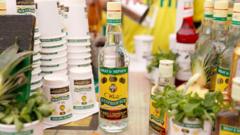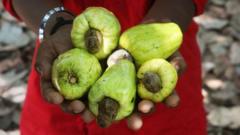As Jamaica tightens rules on rum origin, a significant conflict emerges between local distilleries about the authenticity of Jamaican rum, centered on whether aging overseas undermines its identity.
The Battle for Jamaican Rum: Authenticity vs. Business

The Battle for Jamaican Rum: Authenticity vs. Business
A brewing dispute raises questions about the regulations defining "Jamaican rum" as producers clash over geographic indications and aging processes.
Article Text:
Rum stands as a cornerstone of Jamaica's culture and economy, but the pivotal question remains: what qualifies a rum as Jamaican? This inquiry ignites an ongoing debate on the island as producers push to tighten regulations surrounding the label "Jamaica rum."
In October 2022, the Jamaica Intellectual Property Office (JIPO) sanctioned changes to the geographical indication (GI) designation for Jamaica Rum, initially established in 2016. A key alteration prohibits rum from being aged overseas—a move requested by the Spirits Pool Association (SPA), which advocates for the interests of Jamaica's six main rum distilleries: Appleton, Clarendon, Hampden Estate, Long Pond, New Yarmouth, and Worthy Park Estate.
The SPA contends that a more stringent GI is essential for formal recognition in vital export markets, namely the European Union and the United States. They argue that this recognition will protect Jamaican rum from competitors and help establish its status as a premium product manufactured under strict local standards.
However, the amendment has sparked controversy, as National Rums of Jamaica (NRJ)—which owns a significant share of the Clarendon and Long Pond distilleries—claims the changes threaten its business model. NRJ, backed by the Jamaican government, Demerara Distillers from Guyana, and the West Indies Rum Distillery (WIRD), relies on exporting rum in bulk and aging it abroad, now at odds with the new GI regulations. They assert that rum aged outside Jamaica retains its Jamaican identity, pointing to a long-standing history of overseas aging.
Scheduled for a hearing on April 28, NRJ is appealing JIPO's ruling, while the SPA critiques WIRD's opposition as a reaction only arising after its acquisition by the French spirits conglomerate Maison Ferrand in 2017. Christopher Gentles, SPA's general manager, argues that aging rum abroad compromises its authenticity and quality, emphasizing, "If you truly believe in Jamaica rum, age it in Jamaica."
Furthermore, the SPA warns that exporting and aging rum elsewhere deprives Jamaica of vital local economic benefits, such as bottling and distribution, which could contribute to rum tourism.
According to Dev Gangjee, a professor of intellectual property law at the University of Oxford, geographical indications provide significant value—allowing products to command higher prices, ensuring the preservation of local production identity, and promoting tourism.
In a parallel case, Barbados faces challenges over securing its rum GI, with WIRD similarly opposing local aging requirements. As Jamaica's SPA seeks to gain the EU's Protected Geographical Indication classification for its rum, further disputes are being closely monitored.
Gentles expresses hope for resolving this conflict, wishing for an outcome that, while not fully satisfying either side, retains the essence of Jamaican rum—a product deeply interwoven with the island's heritage. Local media, such as The Gleaner, have backed JIPO's decision, highlighting the importance of maintaining the integrity of Jamaican products against external appropriation, stating, "There should be a commitment to robustly maintain the integrity of the brand."
Rum stands as a cornerstone of Jamaica's culture and economy, but the pivotal question remains: what qualifies a rum as Jamaican? This inquiry ignites an ongoing debate on the island as producers push to tighten regulations surrounding the label "Jamaica rum."
In October 2022, the Jamaica Intellectual Property Office (JIPO) sanctioned changes to the geographical indication (GI) designation for Jamaica Rum, initially established in 2016. A key alteration prohibits rum from being aged overseas—a move requested by the Spirits Pool Association (SPA), which advocates for the interests of Jamaica's six main rum distilleries: Appleton, Clarendon, Hampden Estate, Long Pond, New Yarmouth, and Worthy Park Estate.
The SPA contends that a more stringent GI is essential for formal recognition in vital export markets, namely the European Union and the United States. They argue that this recognition will protect Jamaican rum from competitors and help establish its status as a premium product manufactured under strict local standards.
However, the amendment has sparked controversy, as National Rums of Jamaica (NRJ)—which owns a significant share of the Clarendon and Long Pond distilleries—claims the changes threaten its business model. NRJ, backed by the Jamaican government, Demerara Distillers from Guyana, and the West Indies Rum Distillery (WIRD), relies on exporting rum in bulk and aging it abroad, now at odds with the new GI regulations. They assert that rum aged outside Jamaica retains its Jamaican identity, pointing to a long-standing history of overseas aging.
Scheduled for a hearing on April 28, NRJ is appealing JIPO's ruling, while the SPA critiques WIRD's opposition as a reaction only arising after its acquisition by the French spirits conglomerate Maison Ferrand in 2017. Christopher Gentles, SPA's general manager, argues that aging rum abroad compromises its authenticity and quality, emphasizing, "If you truly believe in Jamaica rum, age it in Jamaica."
Furthermore, the SPA warns that exporting and aging rum elsewhere deprives Jamaica of vital local economic benefits, such as bottling and distribution, which could contribute to rum tourism.
According to Dev Gangjee, a professor of intellectual property law at the University of Oxford, geographical indications provide significant value—allowing products to command higher prices, ensuring the preservation of local production identity, and promoting tourism.
In a parallel case, Barbados faces challenges over securing its rum GI, with WIRD similarly opposing local aging requirements. As Jamaica's SPA seeks to gain the EU's Protected Geographical Indication classification for its rum, further disputes are being closely monitored.
Gentles expresses hope for resolving this conflict, wishing for an outcome that, while not fully satisfying either side, retains the essence of Jamaican rum—a product deeply interwoven with the island's heritage. Local media, such as The Gleaner, have backed JIPO's decision, highlighting the importance of maintaining the integrity of Jamaican products against external appropriation, stating, "There should be a commitment to robustly maintain the integrity of the brand."














